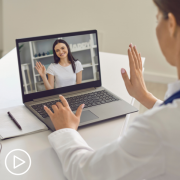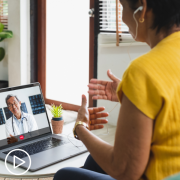MPN Patient Shares Advice for Making the Most of Telemedicine Visit
MPN Patient Shares Advice for Making the Most of Telemedicine Visit from Patient Empowerment Network on Vimeo.
Myeloproliferative neoplasm patient Debbie has had the opportunity to utilize telemedicine in her care. Watch as she shares the pros and cons of telehealth methods in her blood cancer monitoring and her advice to other patients for optimizing virtual visits.
See More From the MPN TelemEDucation Resource Center
Related Resource:

|
Transcript:
Debbie:
I think there is definitely a place for telemedicine in our care. It has enabled us to, or enable me to keep in touch with my hematologist and to understand where my blood counts currently are. What I would also say is, it’s…that there are positives and negatives. I think that the positive of it is the fact that I’ve got a regular update on what my blood counts actually are. I think the negatives of it can be, is that it is quite easy just to move the conversation quite quickly forward. It’s easier for me to just say, everything’s all okay. Thank you for updating me over the telephone, then it is perhaps if I was actually sat in front of somebody.
I think that the challenges it presents is that personal touch, is that feeling of being able to have a one-to-one relationship with your consultant. I don’t think you have that over the telephone.
So, some of the tips that I would share are that you keep in regular contact with your hematologist, you keep regular information on your blood counts, but you keep in a very, very safe environment. You do keep in a safe environment, and that I think is something that’s enormously important. A tip that I would probably give is that make sure that in between your appointments, you do what you would do regularly on a face-to-face and make notes of the things that you want to talk about…because I quite often put the phone down and think, I wish I had said that when I go to the hospital, I will have my notes in front of me and I put them on the table, and I’ll cross-check them with the hematologist at the time, I tend not to do that on the telephone, and perhaps I should, so I would definitely recommend that you treat the tele appointment exactly the same as you would the hospital appointment.





